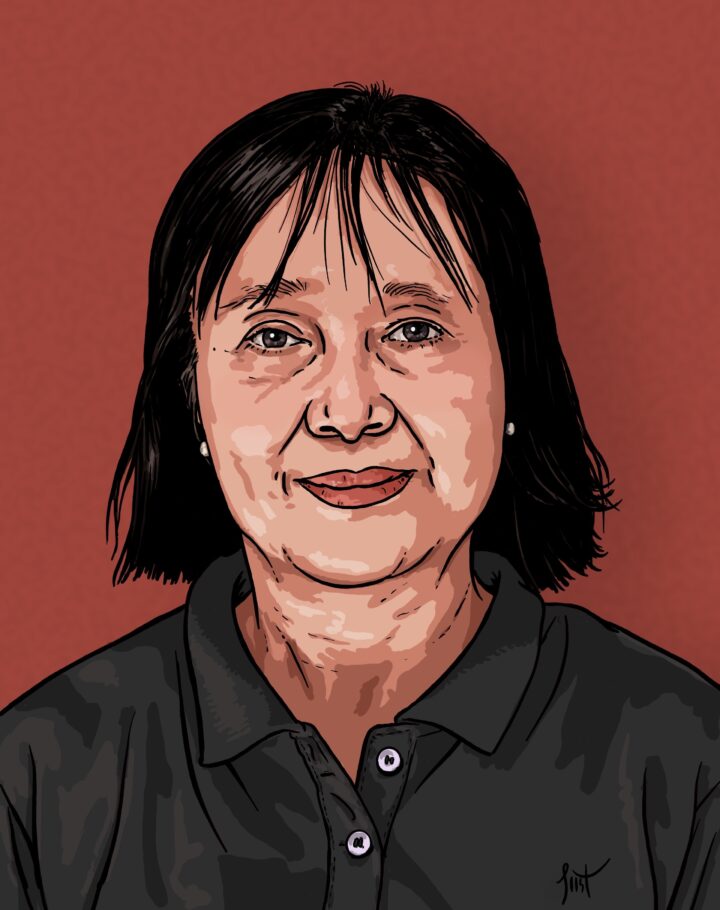
Gerthie Mayo-Anda: “I had the experience of being red-tagged in the nineties. I was shocked when I learned about this. There even used to be a price on my head.”
Philippines
Illustration: Joost Hölscher
Grizelda Mayo-Anda is the co-founder and executive director of the Environmental Legal Assistance Center (ELAC), a Filipino non-government organization committed to helping communities to uphold their constitutional right to a healthful and balanced ecology. She is also a lawyer with over 25 years of field-based practice in environmental advocacy, as well as a professor at the Palawan State University College of Law.
As one of the most mineralized countries in the world, the Philippines has seen its mining industry strive over the past decades. However, this expansion has come with considerable environmental and social costs for the local communities, and accidents often have lasting consequences for the environment. Aside from mining, the ELAC works on cases related to forestry exploitation, fisheries management, and poaching. In relation to mining cases, Mayo-Anda was involved in the Marcopper case. ‘Recently, we won a case against the mining company Marcopper, who was responsible for one of the worst mining disasters that ever hit the Philippines’. This disaster took place in 1993 where a part of the dam, which was constructed and owned by Marcopper, broke down and led to the flooding of toxic waste in the Mogpog River which caused several deaths due to heavy metal contamination. A case has been pending since 2011 against Marcopper. In 2015, Mayo-Anda was asked by Legal Rights and Natural Resources Center (LRC) to work together with their lawyers on this litigation. ‘I worked with new LRC lawyers on the case and we were able to complete the presentation of our witnesses. From my memory, about 12 plaintiffs have died since the case was filed.’ On 16 May 2022, a local court ruled in favour of thirty plaintiffs who were awarded temperate and moral damages.
A problem in the Philippines is the lack of safeguarding environmental legislation. ‘In the Philippines, we have a relatively strong set of environmental laws, regulations and policies’, explains Mayo-Anda, ‘but most of the cases we handle have to do with the improper or weak implementation of the law by the authorities.’ In light of this, corruption remains an important issue in the Philippines. According to Mayo-Anda, the issuance of exploitation permits by the authorities is often made to the detriment of indigenous communities. ‘Many politicians have business interests, and they will use their power and influence to facilitate the exploitation of natural resources. As a result, there has been an increase in violence against land activists and the indigenous communities who are opposed to these projects.’ This influences the work of lawyers as well and this brings a lot of stress to the paralegals, lawyers and communities explains Mayo-Anda. ‘We need to have time for unloading and bonding for our own mental well-being. Philippine lawyers like me pursue advocacy engagements and campaigns on these issues, so-called ‘metalegal’ strategies to complement case build up and litigation work.’ To compel the government to implement its environmental obligations, ELAC relies on both strategic litigation and public advocacy. It involves pursuing advocacy and accountability actions, combining IEC campaigns (including social media) with engaging in dialogues with key government officials and actual litigation, explains Mayo-Anda. So far, this strategy has proved successful.
Another issue faced by lawyers is closely connected to the political context of the Philippines. ‘When I learned that I had been red-tagged by the authorities, I was shocked’, says Mayo-Anda. Red-tagging, defined as the labelling of individuals and groups as communist rebels, is frequently used by state agents to target and prosecute human rights defenders, lawyers, journalists and other activists. The practise has been denounced by the Office of the United Nations High Commissioner for Human Rights (OHCHR) as a ‘persistent and powerful threat to civil society and freedom of expression.’ ‘There even used to be a price on my head’, tells Mayo-Anda, ‘but fortunately, I have not received any death threats so far. We try to maintain a dialogue between us and the military.’ Yet, Mayo-Anda remains cautious, and ELAC has implemented safety protocols to ensure the safety of its staff and volunteers. But for their community partners and clients, the risk of being targeted by the authorities or sued by corporations for libel is not negligible.
In the future, Mayo-Anda hopes to see better enforcement of the international obligations of the Philippines, especially regarding human rights, and for environmental lawyers to share their strategies for advocacy and litigation with their peers.